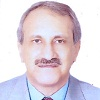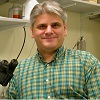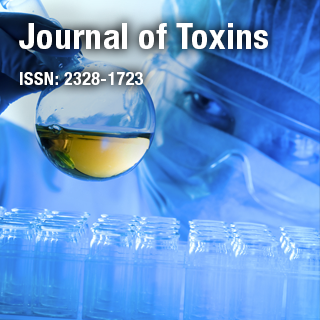Editorial Board
Editor-in-Chief
is Professor in School of Traditional Chinese Medicine at China Pharmaceutical University, China. His research interests are high throughput assay development, neuropharmacology, neurotoxicology, mechanisms of neurodegenerative disease and therapy.

is the Director of Toxicology program & professor of chemistry at University of Guelph. He recieved his PhD in physical & organic chemistry from Queens university Canada. His research focuses broadly on the structure, function and biological activity of modified DNA oligonucleotides.

is Chief of Clinical Chemistry and Toxicology at San Francisco General Hospital and Professor of Laboratory Medicine, University of California, San Francisco. His areas of interest include pharmacogenomics for anticoagulants, especially warfarin, chemotherapeutics and drugs that can induce hypersensitivity reactions .

is the Dean of the research centre POLARIS (Particulate matter and health risk ) and full Professor of Cell Biology at the Department of Earth and Environmental Sciences , University of Milan-Bicocca . Her research is oriented to the biological impact and mechanisms of action of ambient micro and nanoparticle.

is the Head of the Pharmacology and Toxicology, University Kiel, Germany. He is also a Guest Professor in School of Life Science and Technology, Changchun University of Science and Technology, China. His work is concentrated on Gene Expression and Regulation in Steroid Degradation Bacterium Comamonas testosteroni.

is serving as Professor at University of Sevilla, in the department of Nutrition, Food Chemistry, and Toxicology Department, Faculty of Pharmacy. Her research experience has developed in the field of cyanobacteria. She has collaborated in national and regional funded research projects, which are related to this subject.

is a Professor of Forensic Pathology at Faculty of Medicine, Kuwait University, Kuwait. The span of his experience in Forensic Medicine and Toxicology, including the medico legal autopsy service, extends over a period of 35 years. His areas of interest include cardiovascular pathology and forensic anthropology.

is a Professor, Clinical Toxicology, Tanta university, Egypt. He was director of the Tanta Poison Center, Faculty of Medicine Tanta University, Egypt. His research interest includes molecular toxicology, clinical toxicology and occupational toxicology.

is an Associate Professor in the Department of Microbiology and Immunology at the Western University, Canada. His research program is to unravel the signaling mechanisms of host innate immune cells. His current research focuses on the mechanism of pyroptic cell death induced by bacterial toxins and viral factors, and immunomodulation by the probiotic bacterium Lactobacillus rhamnosus.

is adjunct Associate Professor in the School of Public Health at Curtin University and a Senior Research Officer at Western Australia Department of Health. Her research covers Toxicology, Epidemiology and Health promotion. Her current research interests include using multidisciplinary approach to assess and model environmental factors and their impacts on health.

is currently an Associate Professor in the Department of Environmental Toxicology, Texas Tech University, USA. He is also serving as Associate Professor in The Institute of Environmental and Human Health at Texas Tech University. His research focuses on molecular toxicology, molecular epidemiology, cancer and biomarkers.

is a Professor in Department of Cellular Biology and Pharmacology, Herbert Wertheim College of Medicine, Czech Republic. His research interests are studying Acetylcholinesterase reactivators as treatment of nerve agent and pesticide intoxications; Acetylcholinesterase inhibitors in Alzheimer´s disease and Myasthenia Gravis treatment; Synthesis of the detergents as disinfectants.

is a research fellow of National Institute of Environmental Health Sciences (NIEHS/NIH). He received his Ph.D from Chinese Academy of Sciences in Beijing, China. His research interest focuses on oocyte activation, pre-implantation embryo development and environmental health on reproduction.

is currently member of National Institute of Environmental HealthSciences, NIH. His research interest includes understanding the cellular differentiation processes critical to normal development, determining environmental perturbation on the developing embryo leading to human disease, environmental toxicants governing cell’s fate or a cell’s development into malignancy.

is an Assistant Professor at Department of Nutrition and Environmental Toxicology at University of California, Davis. His research include development of mass spectrometric analytical methods for measurement of small molecules in the bio-specimens,deveopment of biomarkers by applying target/profile oriented metabolomic methods and application of metabolomics in toxicology.

is an Assistant Professor of Environmental Health Sciences at the University of South Carolina, Columbia. He received his PhD in Food Science and Environmental Toxicology from Michigan State University after which he did his postdoctoral research in the Cell Biology at Harvard Medical School. His research focuses on fungal cell biology, secondary metabolism and fungal pathogenesis.

is an Assistant Professor, Department of Pharmacology and Toxicology, University at Buffalo, USA. His research interests are studying molecular mechanisms of transcription factor mediated pathways and to discover small molecules that target specific transcription factor conformation; design, synthesis and evaluation of inducers, substrates and inhibitors of drug metabolizing enzymes.

is an Assistant Professor in the department of Toxicology at the University of Louisiana at Monroe, USA. He conducts research in food toxicology, food microbiology, immunology and molecular biology. His other research interests include efficacy testing of natural antimicrobials, Safety evaluation of food ingredients, additives and phytochemicals on human and animal health.

is an Assistant Professor at the Virginia Commonwealth University, USA. Dr. Zhang’s research is committed to understand the pathogenesis of atherosclerosis and obesity. His laboratory is currently investigating the homeostasis of free cholesterol in atherogenesis, and the interactions of adipocytes and adipose stem cells in the pathophysiology of obesity.

is an Assistant Professor, Jain University, Centre for Emerging Technologies (CET), Karnataka, India. His area of expertise includes bimolecular toxinology/toxicology, drug discovery, OMICS Biology-(Proteomics, Transcriptomics, Metabolomics, Genomics & Antivenomics), characterization of therapeutical secretary bio-molecules from diverse sources.

is an Assistant Professor, College of Pharmacy, Qatar University, Doha, Qatar. His research interests are centered around understanding the molecular and cellular mechanisms that contribute to kidney dysfunction during diabetes and obesity.

is an Assistant Professor, School of Science & Technology, Open University of Hong Kong, and an Adjunct Assistant Professor in the Department of Chemistry at the Chinese University of Hong Kong. His research interests include mass spectrometry of biomolecules, toxicology risk assessment, traditional foods carcinogenicity, and identifying and characterizing biomarkers.

is currently a Research Assistant Professor in the Department of Pharmacology and Toxicology at Wright State University, USA. His research interests include examining the roles of renin-angiotensin system (RAS) pathways, stem cells, and extracellular microvesicles (MVs) in hypertension and diabetes related vascular complications with a focus on ischemic and hemorrhagic strokes.

is an Assistant Scientist III at Iowa State University. His research focuses on the discovery & development of novel strategies for the management of important insect pests. He worked on plant protease inhibitors, insect specific neurotoxins & their use in the insect pest control, Bt toxin modifications strategies for improved toxicity towards Hemipteran pests.

is a Senior research scientist at the Ru?er Boškovi? Institute Center for Marine Research, Rovinj, Croatia. He received the PhD degree in biotechnology at the University of Zagreb, Croatia. His principal research interests are molecular toxicology and defense mechanisms and biomarkers, in marine ecosystem. He is coauthor and author of numerous scientific articles and specialist book chapters.

is a member of Human Metabolism Group at National Institutes of Sciences/National Institute of Environmental Health Sciences. She is currently investigating regulation of cytochrome P4502C enzymes by microRNAs. Her research interests include regulation of cytochrome P450 enzymes and environmental toxicology.

is currently working at NIEHS/NIH. His research interest includes understanding the role of glia in inflammation-mediated neurodegeneration, determining cytoskeleton proteins disruption & its corresponding molecular mechanisms in neuropathy induced by environmental toxicants, elucidating the mechanism of ubiquitin proteasome system-mediated neurofilaments degradation.

is Senior Lecturer in Veterinary Physiology and Group Leader of the Plant and Animal Toxicology Group at Charles Sturt University, Australia. Her current research focuses on establishing mechanisms of action and pathogenesis of toxins found in plants which cause in toxicity to domestic livestock with a particular interest in neurotoxicity.

is currently a Senior Lecturer and Head of Biochemistry programmes within the School of Biosciences at the University of Birmingham. His research focusses particularly on how drugs, pollutants and a range of toxins (derived from animals, plants and fungi) interact and affect biological membranes and both Ca2+ channels and Ca2+ pumps.

is a Lecturer in the institute of Pesticide and environmental Toxiciology, Zhejiang University, China. His research interests include environmental Toxiciology to plants, Pesticide synthesis, Resistance of weeds to environmental pollutants.

is a Senior Research Scientist, University of Washington, USA. His research interests are mechanisms of leukocyte infiltration and progressive tissue injuries following severe trauma, mechanisms of tumor cell spreading, activated leukocyte transmigration and how toxins interrupt the blood-brain barrier and elicit neuroinflammation in the brain.


